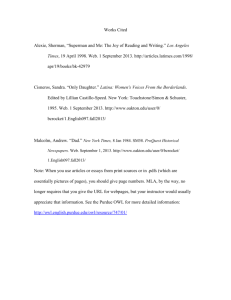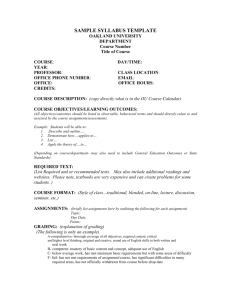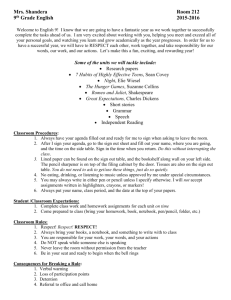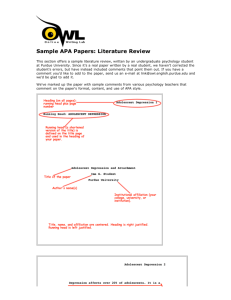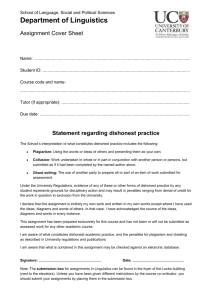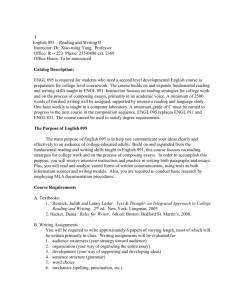Technical Writing ENGL 42100-003
advertisement
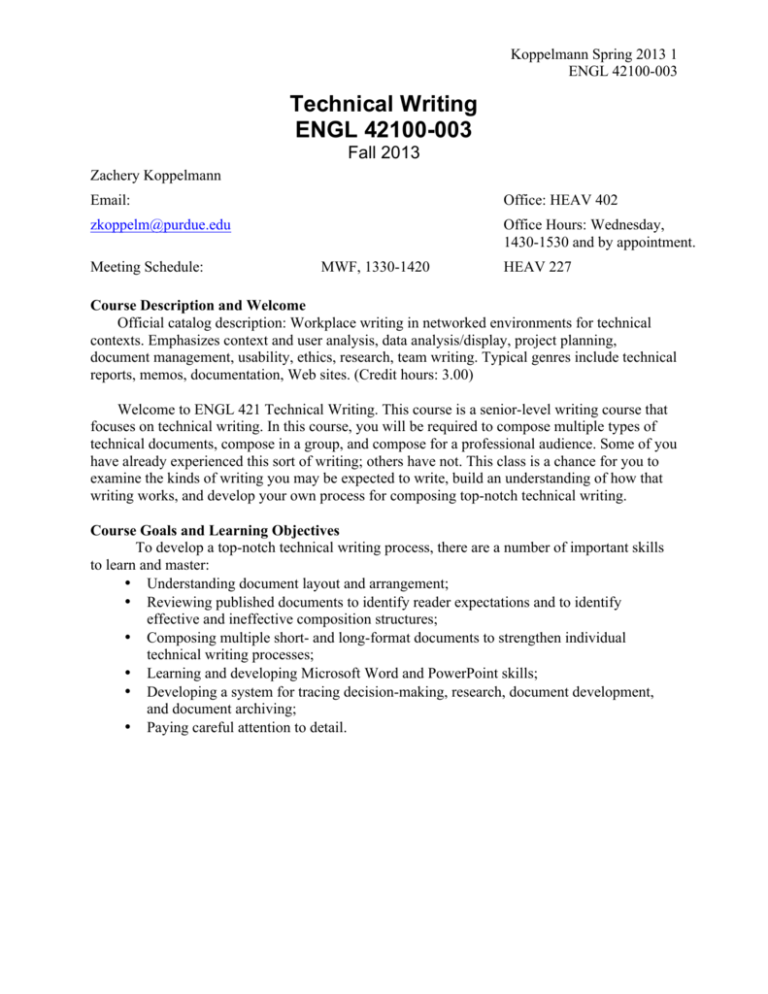
Koppelmann Spring 2013 1 ENGL 42100-003 Technical Writing ENGL 42100-003 Fall 2013 Zachery Koppelmann Email: Office: HEAV 402 zkoppelm@purdue.edu Office Hours: Wednesday, 1430-1530 and by appointment. Meeting Schedule: MWF, 1330-1420 HEAV 227 Course Description and Welcome Official catalog description: Workplace writing in networked environments for technical contexts. Emphasizes context and user analysis, data analysis/display, project planning, document management, usability, ethics, research, team writing. Typical genres include technical reports, memos, documentation, Web sites. (Credit hours: 3.00) Welcome to ENGL 421 Technical Writing. This course is a senior-level writing course that focuses on technical writing. In this course, you will be required to compose multiple types of technical documents, compose in a group, and compose for a professional audience. Some of you have already experienced this sort of writing; others have not. This class is a chance for you to examine the kinds of writing you may be expected to write, build an understanding of how that writing works, and develop your own process for composing top-notch technical writing. Course Goals and Learning Objectives To develop a top-notch technical writing process, there are a number of important skills to learn and master: • Understanding document layout and arrangement; • Reviewing published documents to identify reader expectations and to identify effective and ineffective composition structures; • Composing multiple short- and long-format documents to strengthen individual technical writing processes; • Learning and developing Microsoft Word and PowerPoint skills; • Developing a system for tracing decision-making, research, document development, and document archiving; • Paying careful attention to detail. Koppelmann Spring 2013 2 ENGL 42100-003 Course Requirements Completing this course requires: • Following the attendance policy; • Participating actively in class; • Completing the major assignments: o Biographical Letter; o Einstein’s Letter; o Resume and Cover Letter; o Punter Team Charter; o Word Instructions; o Punter Challenge; o Proposal Presentation Team Charter; o PowerPoint Instructions; o Proposal Presentation. Required Text and Supplies Required Text: Technical Communication Today, 4th edition, Richard Johnson-Sheehan ISBN: 0-205-17119-2 In addition to the textbook, you will need: • A notebook; • A pen or pencil; • A flash drive—1GB is plenty; • One bottle (4-6 oz.) of school or craft glue; • Collect newspapers; • Bring your notebook, pen, and your flash drive to every class; • Reliable access to the Internet and email. I will communicate with you via email often, and email is the best way to contact me. This course will use Blackboard. Assessment All assignments in this course will be turned in electronically. A memo outlining each assignment—including the required format and file name—will be posted on Blackboard. This is an upper-division writing course; do not expect grammar or punctuation lessons. It is assumed that you have already mastered the mechanics of writing in Academic English. If you have questions or need assistance with mechanics, we can arrange a conference. A goal of this class is to promote professional behavior; a hallmark of professionals is careful attention to detail. Each assignment will have very specific requirements concerning format, file format, and file name, and those requirements will be part of the grade for each assignment. You will have seven (7) days after I return an assignment to contest the grade or request a re-grade. I do make mistakes, so please carefully check your assignments to verify that you earned the appropriate score. It is always better to ask than to miss points. If you contest a grade or request a re-grade, I will work with you until the matter is settled—even if it takes longer than seven days. Koppelmann Spring 2013 3 ENGL 42100-003 Participation This course is designed to be interactive. This means you need to actively participate during class discussions and work on class assignments when I give you work time. Leaving early without prior arrangement, texting, non-class related web surfing, and sidebar conversations will negatively affect your grade. Grading Philosophy I tend to follow a grading philosophy that is different from what students expect. While I try to address this in the Descriptions of Grades, I have found this is not enough. To be clear, 70% means you did the assignment with minimal errors. To earn greater than 70%, you will need to produce high quality work that demonstrates independent analysis and personal initiative. Earning an “A” in this class is neither hard nor impossible—it does, however, take more work than many of my previous students expected. In the event you have any questions or concerns regarding my grading philosophy, either come to my office hours or arrange a face-to-face meeting. Description of Grades 90-100 (A- to A)—You did what the assignment asked at a high quality level, and your work shows originality and creativity. Work in this range shows all the qualities listed below for a B; but it also demonstrates that you took extra steps to be original or creative in developing content, solving a problem, or developing a verbal or visual style. 80-89 (B- to B+)—You did what the assignment asked of you at a high quality level. Work in this range needs little revision, is complete in content, is organized well, and shows special attention to style and visual design. 70-79 (C- to C+)—You did what the assignment asked of you. Work in this range tends to need some revision, but it is complete in content and the organization is logical. The style, verbal and visual, is straightforward but unremarkable. 60-69 (D)—You did what the assignment asked at a low quality level. Work in this range tends to need significant revision. The content is often incomplete and the organization is hard to discern. Verbal and visual style is often non-existent or chaotic. Below 60 (F)—Don’t go here. I usually reserve the F for people who don’t show up or don’t do the work. If you give an assignment an honest try, I doubt you would receive an F. If you feel you put in your best effort and still received an F, you might consider dropping from the class. Koppelmann Spring 2013 4 ENGL 42100-003 Policies Attendance Policy Our time together is important, but life is unpredictable. I will allow you four (4) absences without any penalty or question. Each absence beyond the fourth (4) lowers your final grade by 5%. If you are feeling ill with flu-like symptoms—look them up online—I suggest you email me about your condition, do not come to class, and visit the doctor. If you email me and bring me a note from the Student Health Center or a doctor, I will excuse your absence and work with you to make up the missed work. It is important that you email me about the situation before you miss class. Late Assignment Policy Assignments are most often due at the end of class. Specific due dates will be listed on the schedule and in the assignment memos. I do not accept late assignments without previous arrangements. Statement about Disabilities Students with disabilities must be registered with Adaptive Programs in the Office of the Dean of Students before classroom accommodations can be provided. If you are eligible for academic accommodations because you have a documented disability that will impact your work in this class, please schedule an appointment with me as soon as possible to discuss your needs. Academic Integrity and Plagiarism Purdue prohibits "dishonesty in connection with any University activity. Cheating, plagiarism, or knowingly furnishing false information to the University are examples of dishonesty." [Part 5, Section III-B-2-a, University Regulations] Furthermore, the University Senate has stipulated that "the commitment of acts of cheating, lying, and deceit in any of their diverse forms (such as the use of substitutes for taking examinations, the use of illegal cribs, plagiarism, and copying during examinations) is dishonest and must not be tolerated. Moreover, knowingly to aid and abet, directly or indirectly, other parties in committing dishonest acts is in itself dishonest." [University Senate Document 72-18, December 15, 1972] From the Student Guide to Introductory Composition: We take your academic integrity seriously, and so should you. As a writer and student at Purdue, you are cautioned against • submitting someone else's work as your own, even if you have paid for it or obtained the author's permission • using, without acknowledgment, word for word phrases, sentences, or paragraphs from the printed or electronic manuscript material of others • using the materials of another after making only slight changes • using a rewritten form of someone else's materials. These guidelines apply to the work of fellow students as well as the published work of professional writers, information found on the Internet, and electronic compositions such as Web sites and PowerPoint presentations. Penalties for plagiarism are serious and are clearly stated on the Office of the Dean of Students Web Site http://www.purdue.edu/odos/aboutodos/academicintegrity.php Any plagiarism will result in a 0 for the assignment and possibly a failure for this class. Koppelmann Spring 2013 5 ENGL 42100-003 Disaster Statement In the event of a major campus emergency, course requirements, deadlines and grading percentages are subject to changes that may be necessitated by a revised semester calendar or other circumstances beyond the instructor’s control. Relevant changes to this course will be posted onto the course website or can be obtained by contacting the instructor via email. You are expected to read your @purdue.edu email on a frequent basis. The Writing Lab If you have problems or questions about grammar, research, getting started, or revising, please visit the Writing Lab (http://owl.english.purdue.edu/writinglab/), the OWL (http://owl.english.purdue.edu/owl/), or make an appointment with me. Keep in mind that the Writing Lab is not an editing service. They will work with you and try to answer your questions, but they will not line-edit your paper. Do not wait until I return an assignment to ask a question. Final Note I am here for you. If you have questions or concerns, ask me. I check my email regularly. Tell me if you are having trouble. Let me know if the semester is going poorly. I can work with you, but only if you talk to me. Do not let a small concern turn into a larger problem by not talking to me. This document is subject to change. I may or may not have included minor typos in this document. Please let me know if you find them. I have attached a class schedule—complete with assignments and readings.


